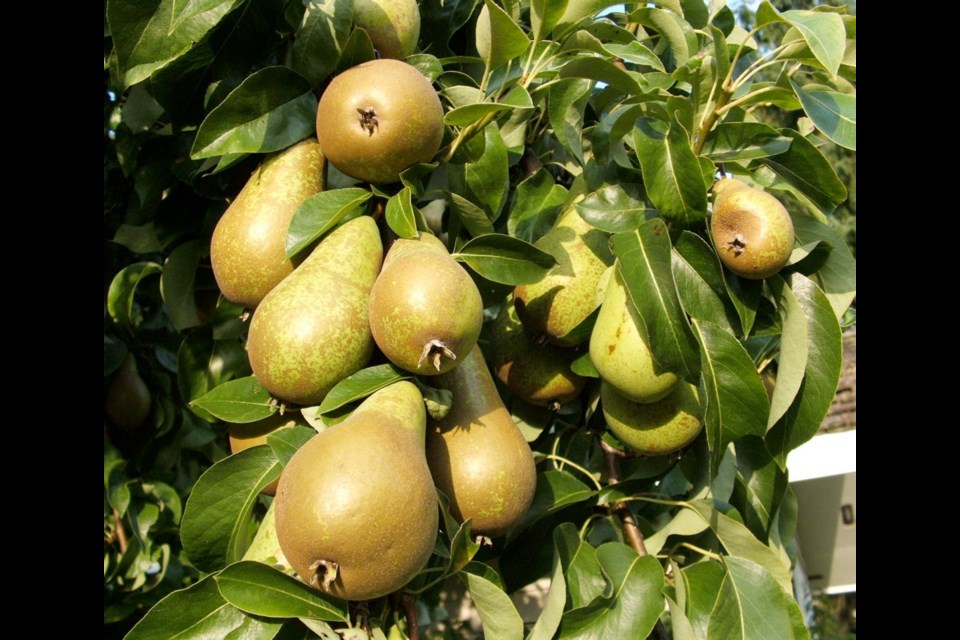Dear Helen: We are looking for a safe dormant oil to help control insects on our apple and pear trees. Would an edible (culinary) oil mixed with dish soap and water work?
N.T.
Spraying with oil and soap mixtures not recommended for garden use could very well harm the plants. I would not risk it. Horticultural oils are specially refined to be light and appropriate for use on plants.
Dormant oils are applied to trees in late winter, before growth starts and as temperatures rise enough to cause insect eggs to begin swelling. That’s when they become most vulnerable to suffocation by the oil mixture. Temperatures need to be above 4 C before applying dormant oil.
Horticultural oils contain highly refined petroleum or canola oils. Linda Gilkeson lists this type of oil under “Least Toxic Pesticides” in her Natural Insect, Weed & Disease Control.
Linda is a highly respected local entomologist and teacher in the Master Gardener Program. She notes that there are “no residual effects” from correctly applied oil sprays, but that labels need to be checked for potential damage to specific plants.
Before spraying, cover plants growing under and around the trees. The oil can damage them. It’s best also to apply sprays only to plants with confirmed pest problems. Sprayed beneficial insects will also die.
Dormant oil controls the over-wintering eggs of many insect pests, among them aphids, mealy bugs, scales and spider mites.
Dear Helen: Late in the fall my strawberry plants turned dark red. Then they became almost black. Is this a disease?
B.C.
Since you observed this change as something unusual, I understand that the leaf discolouration in late fall weather was not just the usual, seasonal browning of older leaves.
The most likely cause, then, is one of the many root-rotting fungus diseases that can afflict susceptible plants, most commonly those growing in cold, wet soil during rainy periods in late fall, winter, and early spring. Heavy, compacted soils that drain poorly and wet, low-lying areas favour these diseases. The disease spores produced on the roots are spread by water.
Red stele is the most common of root-rotting fungus diseases in strawberries. It causes older leaves to turn red, orange, or yellow before they wilt and collapse. Similar symptoms can also be caused by other root disorders, but in red stele the centre (the stele) of the strawberry roots turns red.
This is a very persistent fungus. The remedy is to establish a new strawberry plot with disease free plants in a sunny site that drains efficiently of excess moisture. The soil should be open-textured, humus-rich, fertile, and slightly acidic. Mix a nourishing compost and a balanced, slow-release fertilizer into the soil prior to planting.
GARDEN EVENTS
Eaglecrest meeting. The Eaglecrest Garden Club meets tonight at 7 in the Qualicum Beach Civic Centre, 747 Jones St. in Qualicum. Connie Kuramoto will describe how to care for the creatures in your soil in The World Beneath Your Feet. Learn how to reduce the need for fertilizer and water as you give your garden a noticeable vibrancy.
Native plants. The Native Plant Study Group meets Thursday at 7 p.m. in Room A121 of UVic’s Cornett Building. Dr. Patrick von Aderkas, a professor of forest biology at UVic, will explore the topic Working with Wild Seeds. Non-member drop-in by donation. Students free. Parking cost $3.50 in Parking Lot #4. NPSG.ca.
HCP workshops. The Horticulture Centre of the Pacific, 505 Quayle Rd. in Saanich, is offering the following workshops. To register call 250-479-6162. hcp.ca
• Floral Design. This program is on three levels, beginning with Level 1 on Saturday, Feb. 29, and Sunday, March 1, 9:30 a.m. to 4:30 p.m., with a field trip on March 2. Learn industry-level design techniques and the use of a variety of materials. The course is suitable for those interested in joining the floral industry and those wanting to create arrangements for special events. The next two levels will be in April. Certificates of completion will be issued for each level. Cost per level to HCP members $575, others $610. The cost includes two all-day sessions, a field trip, and all the fresh flowers required.
• Cannabis Basics for the Home Gardener on Saturday, Feb. 29, 10 a.m. to 1 p.m. The class will cover different strains, propagation from seed or clone, growing indoors and outdoors, harvesting, and relevant legislation. Cost to HCP members $60, others $65.



